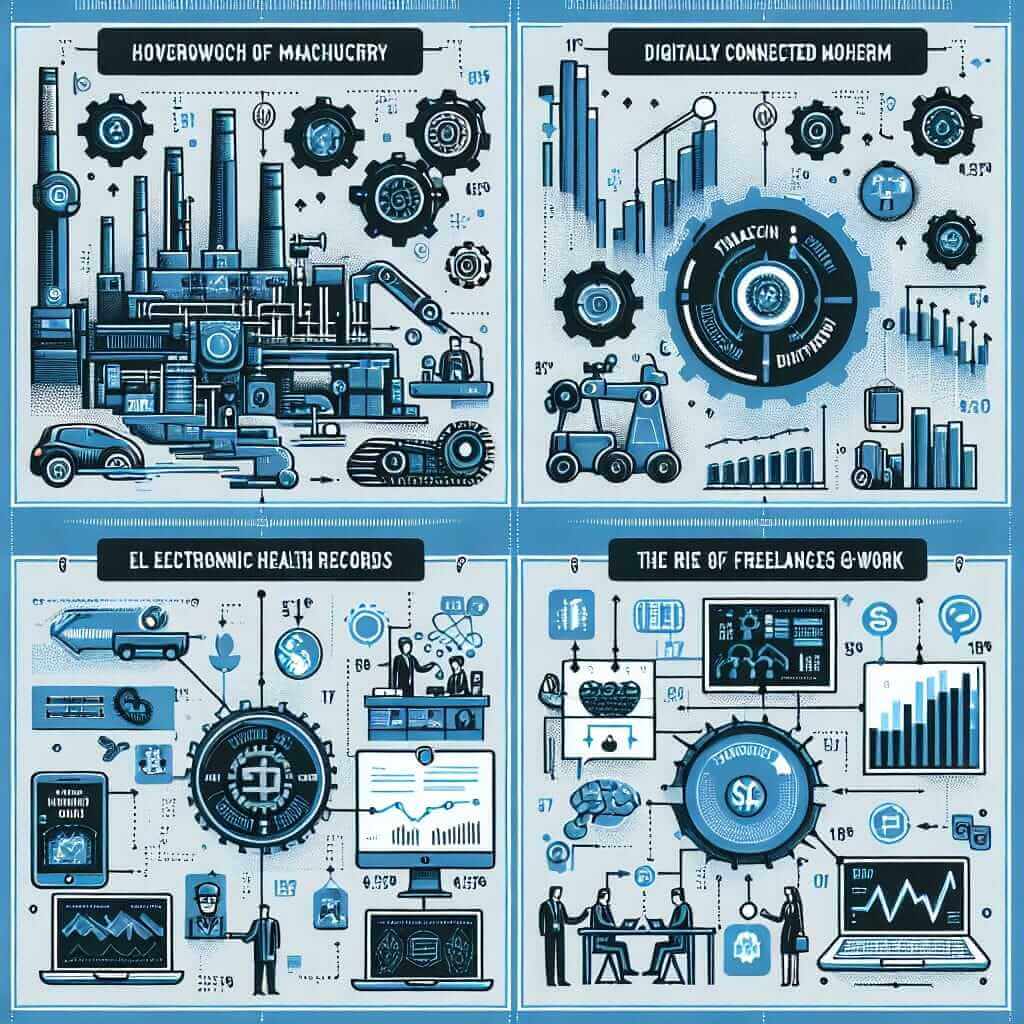The IELTS Reading test is designed to assess a wide range of reading skills, including your ability to comprehend texts, understand English grammar and vocabulary, and extract and interpret information. One frequently appearing theme in the IELTS Reading section involves the effects of digitalization on job markets. This topic has gained prominence due to the rapid advancements in technology and its pervasive impact on employment landscapes globally. Given its relevance and frequency, it’s worth preparing thoroughly to tackle such readings effectively.
Nội dung bài viết
The Reading Practice Test
This practice test is framed under the Medium Text category, involving a passage with intermediate-level complexity, catering to a balanced difficulty level.
Passage Title: The Impact of Digitalization on Employment Structures
Passage:
Digitalization has profoundly altered the employment structures across various industries, leading to both opportunities and challenges in the job market. The advent of advanced technologies such as artificial intelligence (AI) and automation has reshaped traditional job roles and created new ones, while simultaneously rendering some occupations obsolete.
The manufacturing sector, for instance, has experienced significant transformations due to automation. Robots now perform tasks that were once manual, resulting in enhanced efficiency but also job redundancies. Similarly, AI-driven algorithms in sectors like finance, healthcare, and customer service have streamlined operations, yet necessitated a shift in skill requirements.
Digital platforms have facilitated the emergence of the gig economy, characterized by short-term contracts or freelance work as opposed to permanent jobs. This trend has provided flexibility and independence to workers but also led to concerns about job security and lack of benefits. Companies like Uber and Upwork exemplify this shift.
However, digitalization also heralds new job opportunities. The tech industry is burgeoning with roles requiring expertise in software development, cybersecurity, and data analysis. The demand for IT professionals continues to soar, illustrating the positive side of this digital transition.
Nevertheless, a significant challenge posed by digitalization is the skills gap. As technology evolves rapidly, the workforce must continually upskill to remain relevant. Educational institutions and vocational training programs play a crucial role in bridging this gap.
In summary, while digitalization disrupts traditional employment structures, it concurrently drives innovation and opens new career pathways. Adaptability and lifelong learning are essential for navigating this dynamic job market.
Visualization Code:

Questions:
1. Multiple Choice:
1.1 According to the passage, what has been the impact of automation in the manufacturing sector?
- A. Increased job creation
- B. Job redundancies and increased efficiency
- C. Decreased efficiency
- D. Decline in product quality
2. Identifying Information (True/False/Not Given):
2.1 The passage states that digitalization has entirely negative impacts on the job market.
- True
- False
- Not Given
2.2 Educational institutions are highlighted as essential for addressing the skills gap.
- True
- False
- Not Given
3. Matching Headings:
3.1 Match the following headings to the appropriate paragraph in the passage:
- A. Emergence of the Gig Economy
- B. Advent of AI and Automation
- C. Challenges of Skills Gap
- D. Job Opportunities in the Tech Industry
4. Sentence Completion:
4.1 Digital platforms have led to the rise of the __, characterized by freelance work and short-term contracts.
4.2 To stay relevant in a rapidly evolving job market, the workforce must __.
Answer Keys and Explanations:
1. Multiple Choice:
1.1 B. Job redundancies and increased efficiency
- Explanation: The passage mentions that automation in the manufacturing sector has led to enhanced efficiency but also job redundancies.
2. Identifying Information:
2.1 False
- Explanation: The passage discusses both positive and negative impacts of digitalization on the job market.
2.2 True
- Explanation: The passage specifically highlights the role of educational institutions in addressing the skills gap.
3. Matching Headings:
3.1
- A. Emergence of the Gig Economy – Paragraph 3
- B. Advent of AI and Automation – Paragraph 2
- C. Challenges of Skills Gap – Paragraph 5
- D. Job Opportunities in the Tech Industry – Paragraph 4
4. Sentence Completion:
4.1 gig economy
- Explanation: The passage describes the gig economy as characterized by short-term contracts or freelance work.
4.2 upskill continually
- Explanation: The passage emphasizes the need for the workforce to upskill to stay relevant.
Common Mistakes in Reading Tests:
- Skimming too quickly and missing key details.
- Misinterpreting True/False/Not Given questions.
- Getting stuck on unfamiliar vocabulary and losing time.
Vocabulary:
- Automation (noun): The use of largely automatic equipment in a system of operation. (ˌɔːtəˈmeɪʃən)
- Gig economy (noun): A labor market characterized by the prevalence of short-term contracts or freelance work. (ɡɪɡ ɪˈkɒnəmi)
- Skills gap (noun): The difference in the skills required on the job and the actual skills possessed by the employees. (skɪlz ɡæp)
Grammar and Usage:
- Complex sentences: Frequently utilize complex or compound-complex sentences to convey detailed information. Example: “While digitalization disrupts traditional employment structures, it concurrently drives innovation and opens new career pathways.”
- Passive voice: Often employed in academic writing. Example: “The tech industry is burgeoning with roles requiring expertise in software development, cybersecurity, and data analysis.”
Advice for IELTS Reading Success:
- Practice Regularly: Consistent practice with diverse reading materials enhances comprehension and speed.
- Expand Vocabulary: Broadening your vocabulary helps in understanding texts better and faster.
- Understand Question Types: Get familiar with different types of questions, as each requires a unique approach.
- Time Management: Practice under timed conditions to improve your time management skills.
For further reading and practice, you can check our related articles on the Effects of Technological Innovation on Employment.